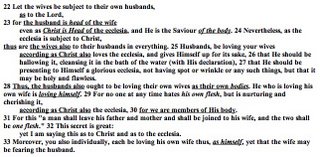But if we look at the passage closely, at best accurately translated, we will soon find out that Paul does not use the figure of the bride for the body of Christ.

The graphic I inserted here shows the text of Eph 5 and is formated in such a way as to show the corresponding parts of the text. The indented and unindented bits correspond topic-wise respectively. The unindented ones give us the relationship between man and wife (human perspective), whereas the indented lines describe the relationship between Christ and his out-called people ('the church') (divine perspective).
Throughout the text we learn through the little Greek words for 'as' and 'according as' how the relationship of man and wife relates to the relationship between Christ and His church:

This is how the two relationships relate, clearly stated in vv. 23, 28, and 30. Please note the fact that the ecclesia is not denoted as the wife of the Christ anywhere here in this passage. Rather, Christ, the head, and the husband correspond, and the ecclesia, the body of Christ, and the wife correspond.

This is how the two relationships relate, clearly stated in vv. 23, 28, and 30. Please note the fact that the ecclesia is not denoted as the wife of the Christ anywhere here in this passage. Rather, Christ, the head, and the husband correspond, and the ecclesia, the body of Christ, and the wife correspond.
Now, my friend in the faith claimed that the quote from Gen 2:24 proves that the imagery of the bride/wife is used of the body of Christ as well. But this is not in the text. The whole scope of the passage disproves it.
If we take even just a brief look at the context of the Genesis text, we will notice that the man leaves his parents because the woman was part of his body once and he wants to be rejoined to her. The body or the flesh is in view, not the fact that the person for whom the man is leaving his parents is a woman or his wife.
Again, verse 31 corresponds with the other verses that give us the human perspective or relationship. In this sphere, and according to the context of the quoted Genesis verse, the man loves his wife because she was part of his body, and, initially, the man leaves his parents to love and be joined to her for the same reason. In other words, the love, or the desire to become one flesh with the woman, which is an expression of love, of the husband is in view in verse 31, just as it is in verses 25a, 28, 29a, and 33.
What about verse verse 32 then? 'This secret' seems to refer to the expression of the love of the man towards the woman. The being one flesh of the man and the woman apparently foreshadows the being one flesh of the Christ and His ecclesia. And exactly here is the point where the relation stops: Only the "one-fleshness" of man and woman corresponds with Christ and His ecclesia. Just as the man is head of the woman, and the woman part of the body of the man, thus also is Christ Head of the ecclesia, and the ecclesia is part of the body of Christ.
The body (of Christ) is not denoted as bride or wife of Christ in this and no other passage of the bible. The body of Christ is a distinct group of believers; it does not belong to the bride, which is saved and protected Israel in the time of restoration of the Kingdom to Israel on this earth (cp. Isa 49(:18), 61(:10), 62(:5), best read in context! Also Jn 3:29, Rev 19:7, 21:2,9).

No comments:
Post a Comment